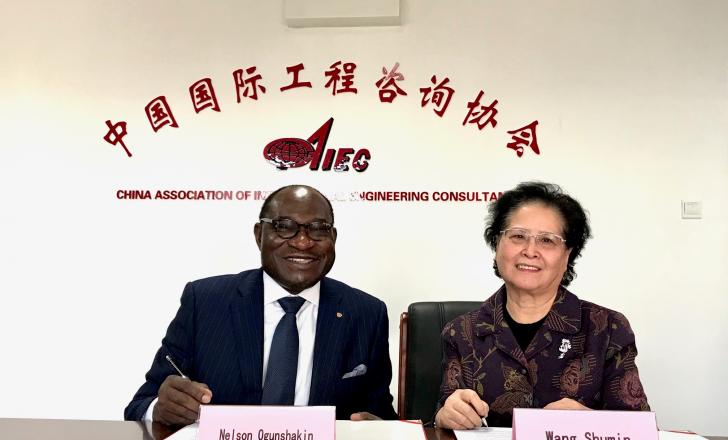
The International Federation of Consulting Engineers (FIDIC) has signed key agreements for the Chinese market and also for the African market.
The FIDIC has signed a memorandum of understanding (MoU) with the China Association of International Engineering Consultants (CAIEC). The aim of this agreement is to improve collaboration between international and Chinese businesses. The arrangement will operate across a number of key areas and improve the competence of Chinese consultants in planning, design and the management and application of FIDIC contracts.
FIDIC and CAIEC, a national, professional, non-profit organisation comprising qualified consultant experts and legally registered enterprises engaged in foreign investment and international engineering consulting, signed the three-year MoU following detailed discussions between the two organisations. CAIEC and FIDIC agreed to collaborate in key areas of interest. One is for an information exchange, involving sharing of information on publications, exchanging weblinks, information sharing on events and exchanging knowledge and tools on engineering design issues. Another is for membership and CAIEC and FIDIC will explore how they can develop a membership model in China. The aim will be to provide a better representation of the consulting engineering industry by the Chinese FIDIC member association, the CNAEC, and to work together to support international consultants becoming members of CAIEC. The third will be to develop events and visits so that the FIDIC and CAIEC will conduct exchange visits to explore collaborative issues, invite each other to participate in their respective events. In addition, CAIEC will invite FIDIC to send speakers to its conferences and workshops.
Looking further ahead, the two bodies will work jointly on training and certification programmes. The two will discuss establishing a consulting engineer training and certification programme to meet the needs of the various modes of international engineering and consulting services.
For the One Belt One Road programme, the two will provide opportunities for discussion and collaboration between Chinese, international and local consultants on the Belt and Road initiative (BRI). The two will jointly explore the application of FIDIC contracts and FIDIC Golden Principles for BRI projects and develop standard templates for documents to support their use. FIDIC and CAIEC will also support the principle that the planning, design and supervision of BRI projects are undertaken by collaborative integrated teams of Chinese, international and local consultants. This will be to optimise outcomes in line with FIDIC’s values of quality, integrity and sustainability and the legacy created for society.
Commenting on the signing of the MoU, FIDIC chief executive Dr Nelson Ogunshakin said: “I am delighted that FIDIC has signed this landmark agreement with CAIEC and to be working closely with them on areas of mutual interest. Our MoU will be a big boost for FIDIC members, international consulting and engineering firms and also the construction sector in China and we are looking forward to working with CAIEC over the next three years.”
FIDIC president Bill Howard said: “This agreement is another significant step in FIDIC’s efforts to work in global partnership with the Chinese construction industry. I am delighted to see such collaboration between industry associations in China and I am sure that by working together in a spirit of partnership we will be able to promote mutual understanding and achieve increased cooperation across the construction sector in China, thereby improving the quality, sustainability and delivery of services.”
Meanwhile the African Development Bank has signed a five-year agreement to use FIDIC standard contracts. This move will see the international funding organisation include the use of seven FIDIC standard contracts for the next five years.
Under the terms of the agreement, FIDIC has granted the bank a non-exclusive licence to refer to the seven major FIDIC contracts for projects they finance and the documents may be used as part of the bank’s standard bidding documents. The contracts include the latest 2017 Second Edition FIDIC contracts and 1999 editions, which cover a wide range of international construction and infrastructure work.
The move by AfDB is another significant endorsement for FIDIC contracts from a multilateral development bank. This follows similar agreements signed with the World Bank, Inter-American Development Bank, Caribbean Development Bank, the European Bank for Reconstruction and Development and the Asian Infrastructure Investment Bank.
FIDIC chief executive Dr Ogunshakin said: “We are delighted to have signed this agreement with the AfDB, an organisation doing fantastic work fighting poverty and improving living conditions for people in Africa. The signing of this agreement means that FIDIC has now entered into similar licencing agreements with almost all of the major global funding organisations.
“The bank’s endorsement should also provide additional comfort to the financial, institutional and private equity investors operating in the global market to adopt the use of FIDIC standard procurement contracts to mitigate the risks associated with investable infrastructure asset class.”
Commenting on the agreement, Frank Mvula, the bank’s director of fiduciary services and inspection, said: “We are glad to have concluded an agreement with FIDIC that would enable us to incorporate FIDIC contracts in some of our standard bidding documents. There is no doubt that the use of FIDIC contracts is a step towards enhancing equity and fairness as well as efficient and effective contract management as emphasised under the bank’s new procurement framework.”
FIDIC president Howard said: “I’m delighted that FIDIC has concluded this agreement with the AfDB. It’s a key aim of ours to strengthen FIDIC’s relationships with the multilateral development banks and other international funding institutions as improved communication and cooperation will bring benefits to the whole industry. Agreements like these can only be good for FIDIC, the global infrastructure sector and the banks and I look forward to a mutually beneficial relationship with AfDB over the coming years.”











